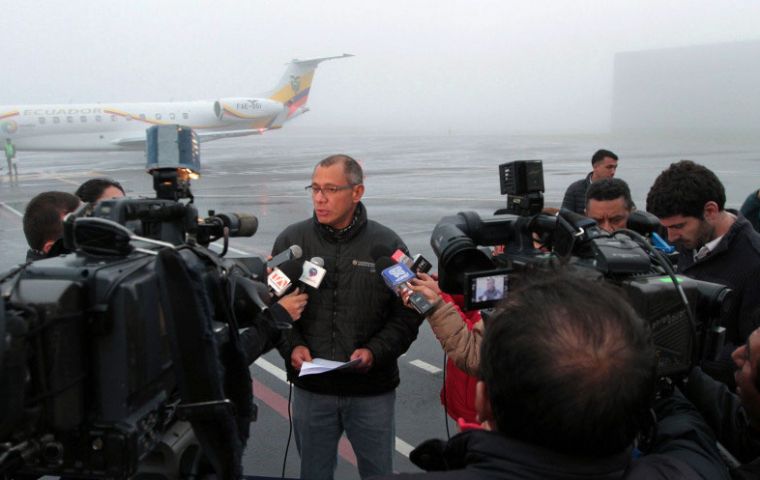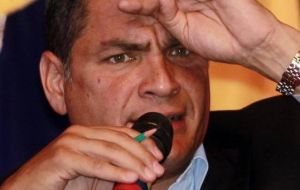MercoPress. South Atlantic News Agency
Ecuador quake primary toll: 262 killed and over 2.500 injured, but climbing
 Vice President Jorge Glas said the toll, 262 killed and over 2.500 injured was likely to rise because a large number of people remained unaccounted for
Vice President Jorge Glas said the toll, 262 killed and over 2.500 injured was likely to rise because a large number of people remained unaccounted for  Much damage was reported in the cities of Manta, Portoviejo and Guayaquil, which are all several hundred kilometers from the epicenter of the quake
Much damage was reported in the cities of Manta, Portoviejo and Guayaquil, which are all several hundred kilometers from the epicenter of the quake  President Correa cut short a trip to Italy to oversee relief efforts and declared a national emergency. He urged Ecuadoreans to stay strong and united.
President Correa cut short a trip to Italy to oversee relief efforts and declared a national emergency. He urged Ecuadoreans to stay strong and united. Aid began to flow in Sunday to areas devastated by Ecuador's strongest earthquake in decades and the death toll continued to rise as people left homeless hunkered down for another night outside in the dark.
Officials said the quake killed at least 262 people and injured more than 2,500 along Ecuador's coast. Vice President Jorge Glas said the toll was likely to rise because a large number of people remained unaccounted for, though he declined to say how many.
Much damage was reported in the cities of Manta, Portoviejo and Guayaquil, which are all several hundred kilometers from the epicenter of the quake that struck shortly after nightfall Saturday.
But the loss of life seemed to be far worse in isolated, smaller towns closed to the center of the earthquake.
In Pedernales, a town of 40,000 near the epicenter, soldiers put up a field hospital in a stadium where hundreds of people prepared to sleep outside for a second straight night. Downed power cables snaked across the streets with no prospect of electricity being restored soon, making it unsafe for many to return to their home
The town's mayor said looting broke out Saturday night amid the chaos but with the arrival of 14,000 police and soldiers to towns in the quake zone the situation appeared more under control.
President Rafael Correa, who cut short a trip to Rome to oversee relief efforts, declared a national emergency and urged Ecuadoreans to stay strong.
“Everything can be rebuilt, but what can't be rebuilt are human lives, and that's the most painful,” he said in a telephone call to state TV before departing for Manta, where he arrived just before nightfall to be briefed by aides.
More than 3,000 packages of food and nearly 8,000 sleeping kits were being delivered Sunday. Ecuador's ally, Venezuela, and neighboring Colombia, where the quake was also felt, organized airlifts of humanitarian aid. The European Union, Spain, Peru and Mexico also pledged aid.
Rescuers scrambled through ruins in the provincial capital Portoviejo, digging with their hands trying to find survivors.
Electricity mostly remained out in Manabi province, the hardest-hit region, as authorities focused on finding survivors.
“Compatriots: Unity, strength and prayer,” the vice president told a throng of people in Manta as he instructed them on how to look for survivors. “We need to be quiet so we can hear. We can't use heavy machinery because it can be very tragic for those who are injured.”
On social media, Ecuadorians celebrated a video of a baby girl being pulled from beneath a collapsed home in Manta.
But fear was also spreading of unrest after authorities announced that 180 prisoners from a jail near Portoviejo escaped amid the tumult after the quake.
Shantytowns and cheaply constructed brick and concrete homes were reduced to rubble along the quake's path. In the coastal town of Chamanga, authorities estimated than 90% of homes had damage, while in Guayaquil a shopping center's roof fell down and a collapsed highway overpass crushed a car. In Manta, the airport closed after the control tower collapsed, injuring an air traffic control worker and a security guard.
In the capital, Quito, terrified people fled into the streets as the quake shook buildings. One resident shot a video of his lamps and hanging houseplants swinging wildly for more than 30 seconds as the building rocked back and forth. The quake knocked out electricity in several neighborhoods and a few homes collapsed, but after a few hours power was being restored.
The government said it would draw on $600 million in emergency funding from multilateral banks to rebuild. Hydroelectric dams and oil pipelines in the OPEC-member nation were shut down as a precautionary measure but there were no reports of damage to them.
The government called it the worst quake in the country since 1979. In that disaster, 600 people were killed and 20,000 injured, according to the US Geological Survey.
The U.S. Geological Survey originally put the quake at a magnitude of 7.4 then raised it to 7.8. It had a depth of 19 kilometers. More than 135 aftershocks followed, one as strong as magnitude-5.6, and authorities urged residents to brace for even stronger ones in the coming hours and days.




Top Comments
Disclaimer & comment rulesCommenting for this story is now closed.
If you have a Facebook account, become a fan and comment on our Facebook Page!